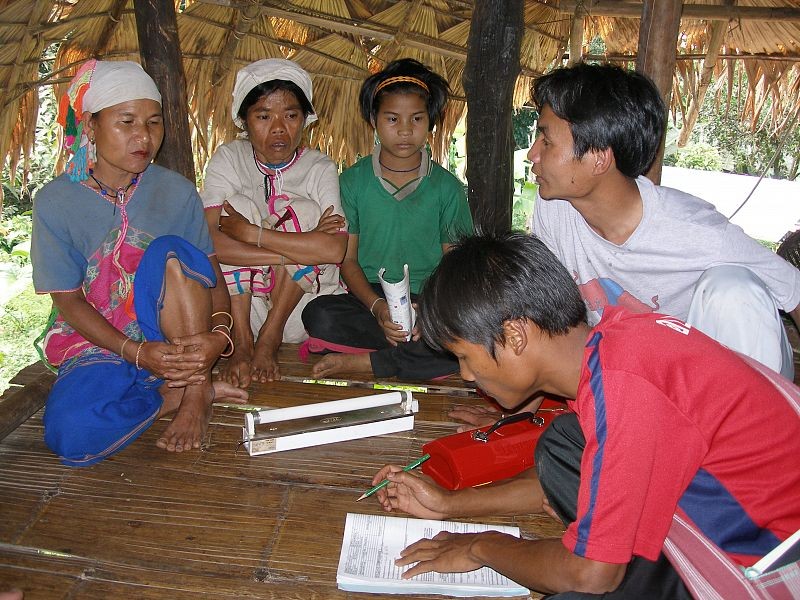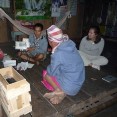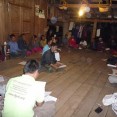To restore and expand solar energy access to homes in rural Thailand

This projects implemented by BGET piloted a system to maintain and repair existing small solar power systems disbursed throughout rural Thailand. Nationally over 200,000 systems of 120 W each were installed with financial support by the Thai government in 2004. Over 50% of these systems are not fully operational and in need of repair.
Through the Solar Home System (SHS) Repair Empowering Village Franchisees system, local solar entrepreneurs were trained to analyze and repair these broken systems. BGET further installed a revolving fund to re-invest the profits made from the pay-back of these systems into further expansion of the program.
Background
Energy access in rural Thailand is limited and most people rely on imported fossil fuels as their energy source. Although the Ministry of Energy aims to increase the share of renewable energy sources to 25% by 2022, these technologies are too expensive for most rural communities.
In 2004, the Thai government decided to subsidise and install 200,000 solar home systems in off-grid communities. Although this initiative provided solar power to many rural homes, the United Nations Development Programme discovered that only a few years later over 80% of these systems were no longer working. The main reasons for this situation were the use of low quality materials and the failure of the government to develop a long-term maintenance plan. In addition, the lack of responsibility of the SHS owners – the Thailand Provincial Electrical Authority and, later, local government offices – was also a contributory factor.
Aware of these problems, BGET initiated and implemented a pilot project to restore these broken systems by establishing village franchisees that could maintain and repair these and other small-scale solar photovoltaic systems.The project activities were divided into three stages:
- The project started with a stakeholder assessment which included questionnaires for local villagers and the contacting of local government representatives as well as community leaders. Based on these findings BGET launched the pilot project in five villages, where 76 households signed up to repair their solar home systems. At the same time BGET conducted a recruitment process for interested local franchisees with technical experience. In the end, one full-time village technician was hired.
- The next step was to actually train the technician and to renew - or repair - the old solar systems of the 76 households.
- The last task was to evaluate the project outcome and to decide on the way forward. To this end, the project team conducted a customer satisfaction evaluation and, as a result of this survey, the financial model was modified. In addition, meetings with local government organisations are planned to discuss the expansion of the successful programme.
Technology, Operations and Maintenance
The original solar home systems used 120W solar panels and were designed to power two 10W fluorescent lights for six hours and a television for two hours per night. Although most of the home systems no longer functioned, most of the solar panels were still operational.
In cooperation with the project team the trained local technician carried out repairs to the existing systems. The users had to pay an agreed fee so that the repair and installation service could become a financially independent social enterprise.
In total, 76 solar home systems were repaired. 27 of the systems needed to be completely replaced because only the panels were still operational, 7 systems needed new controller or/ and inverter units, 49 systems required new batteries, and 29 systems needed new lights. In addition to the training received by the technician, the end users also received customer orientation on proper product use and basic system maintenance training.

Financial Issues and Management
To provide the rural low-income households with the financial means to pay for the required repairs and maintenance a micro-loan model was developed. This micro-loan model provides options for households to make repayments over a two-year period.
The average cost of restoring a single solar home system was estimated to be €440. Depending on the repairs required, household had to pay between €24 and €95 by the end of the first and second years. By the end of two years, the end users will own the systems and will have the option to extend the maintenance service by paying a yearly fee. Prior to the implementation of the project, the question of ownership of the solar home systems was unsettled.
Environmental Issues
The amount of CO2 reduction generated through the project activities is estimated to be 4,800 kg CO2/year. The potential further CO2 reduction should all the solar home systems across the country be repaired is approximately 12,500 t CO2/year.
Social Issues
Initially villagers were skeptical and opposed to the pilot project because of their negative experience with the government solar programme, but the innovative approach and the engagement of the BGET team helped to build trust within the communities. Furthermore, the support of the local governments was very important for the community members. In the end, they were confident enough to sign up for the solar system restoration and to agree to pay for the equipment and maintenance.
In terms of employment, one villager was hired as full-time local technician. He is in charge of the system monthly check-up, fee collection and equipment repair or replacement. He will continue working during the rainy season when the roads are impassable and no external service providers or technicians can access the villages.
Another positive effect of the project is that the 76 families who participated benefit from improved lightning. This means that the children in these households receive better lighting to do schoolwork and the women are also able to do housework and other income-generating activities.

Results & Impact
As part of the project, 76 households signed up to repair their solar home systems and, after finishing the repairs in these 76 households, more villagers became interested in having their own systems repaired.
As a result of the project, BGET has worked with the Global Social Benefit Incubator at the Santa Clara University and the Clinton Global Initiative 2011, committing to restore and expand solar energy access to a further 100 homes in rural Thailand.
Replicability
With over 200,000 solar systems installed during the nationwide government programme, of which 80% are not working properly and are in need of repair, the project has the potential to be replicated and expanded in rural communities throughout Thailand. The constraints for further replication include the availability of qualified personal, difficulties to establish government connections in the new areas and the large initial investments.
Lessons learned
Two major difficulties were faced during the pilot project activities. One difficulty encountered was the rural infrastructure, such as impassable roads in rainy season. The other difficulty concerned the relationships with the different stakeholders. A lot of work was initially required to gain the trust of the rural communities. Therefore, it was also essential to establish active collaboration with local governments and community leaders and, in addition, it was important to maintain strong relationships with users as well as technology suppliers.
For future success it is crucial that trained village technicians provide excellent customer service on an on-going basis, because only satisfied users will continue to use and recommend this technology.
Projects with same technology
Promoting sustainable livelihoods at Lake Victoria by introducing solar lamps for night fishing
To replace kerosene lights for night fishing by introducing energy hubs to power sustainable lighting systems
Business Opportunities With Solar Energy In Unelectrified Areas
To encourage entrepreneurship and enhance access to modern energy services in the off-grid rural and informal settlements of Namibia
Projects in same country
Biogas Generation through Biomass Production in a "Smart School" in the Lower Northern Region of Thailand
The aim of this project is to use food and agricultural waste, as well as animal dung, to generate biogas energy for producing/cooking school lunches at seven schools in Thailand.